语 法 讲 解 ——虚拟语气
- 格式:doc
- 大小:43.50 KB
- 文档页数:11
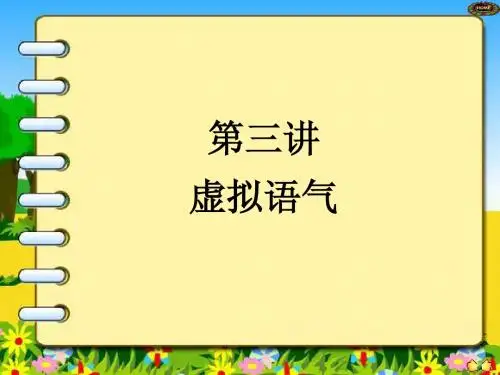
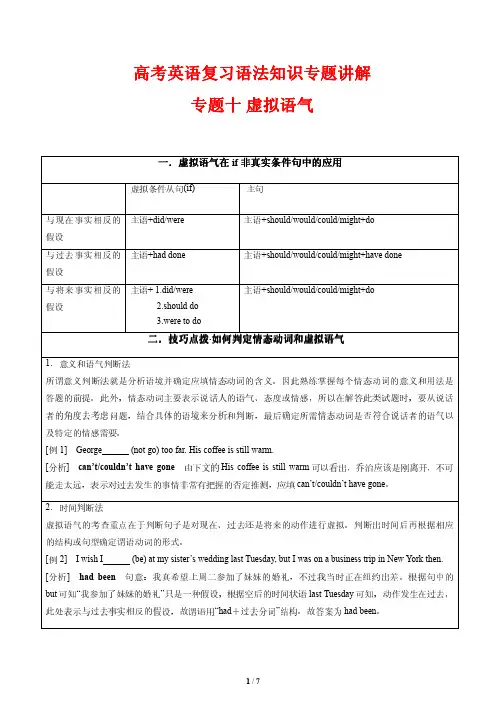

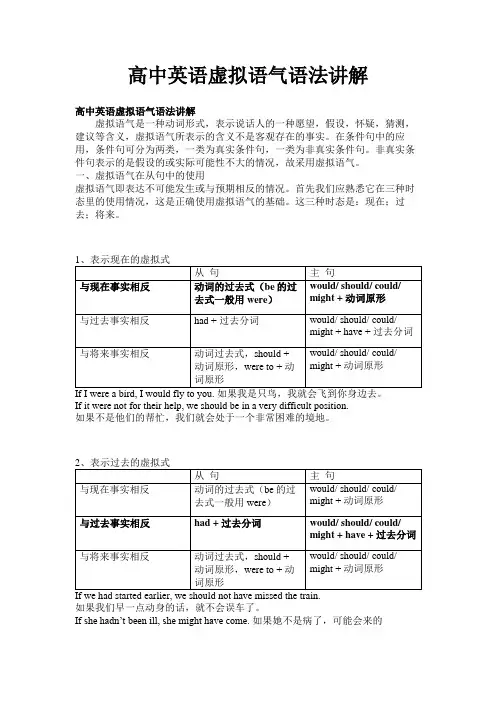
高中英语虚拟语气语法讲解
高中英语虚拟语气语法讲解
虚拟语气是一种动词形式,表示说话人的一种愿望,假设,怀疑,猜测,建议等含义,虚拟语气所表示的含义不是客观存在的事实。
在条件句中的应用,条件句可分为两类,一类为真实条件句,一类为非真实条件句。
非真实条件句表示的是假设的或实际可能性不大的情况,故采用虚拟语气。
一、虚拟语气在从句中的使用
虚拟语气即表达不可能发生或与预期相反的情况。
首先我们应熟悉它在三种时态里的使用情况,这是正确使用虚拟语气的基础。
这三种时态是:现在;过去;将来。
If it were not for their help, we should be in a very difficult position.
如果不是他们的帮忙,我们就会处于一个非常困难的境地。
如果我们早一点动身的话,就不会误车了。
If she hadn’t been ill, she might have come. 如果她不是病了,可能会来的。
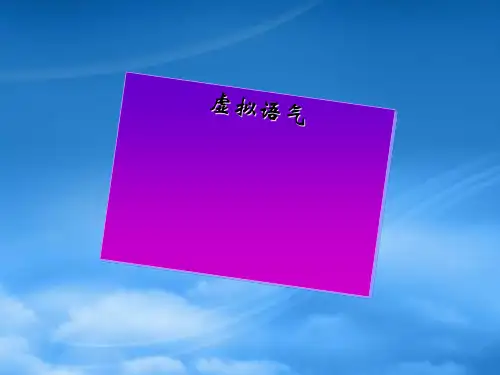
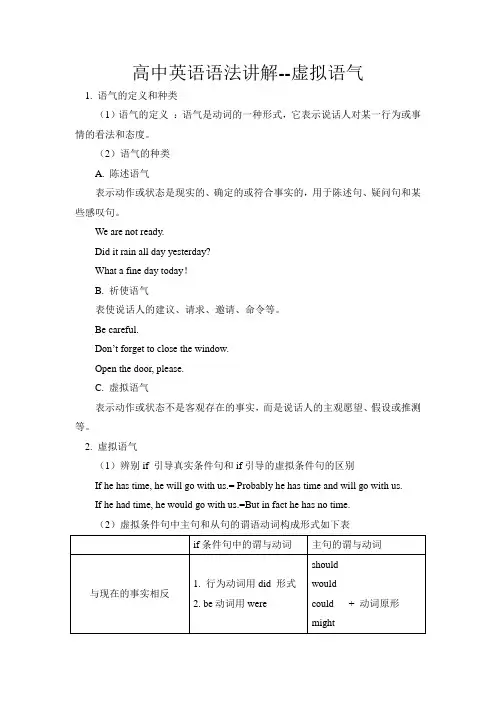
高中英语语法讲解--虚拟语气1. 语气的定义和种类(1)语气的定义:语气是动词的一种形式,它表示说话人对某一行为或事情的看法和态度。
(2)语气的种类A. 陈述语气表示动作或状态是现实的、确定的或符合事实的,用于陈述句、疑问句和某些感叹句。
We are not ready.Did it rain all day yesterday?What a fine day today!B. 祈使语气表使说话人的建议、请求、邀请、命令等。
Be careful.Don’t forget to cl ose the window.Open the door, please.C. 虚拟语气表示动作或状态不是客观存在的事实,而是说话人的主观愿望、假设或推测等。
2. 虚拟语气(1)辨别if 引导真实条件句和if引导的虚拟条件句的区别If he has time, he will go with us.= Probably he has time and will go with us.If he had time, he would go with us.=But in fact he has no time.(2)虚拟条件句中主句和从句的谓语动词构成形式如下表if条件句中的谓与动词主句的谓与动词与现在的事实相反1. 行为动词用did 形式2. be动词用wereshouldwouldcould + 动词原形might与过去的事实相反had + doneshouldwouldcould + have + donemight与将来的事实相反1. 行为动词用did2. should + 动词原形3. were to + 动词原形shouldwouldcould + 动词原形might(3)混合时间的虚拟语气如果条件句中的动作和主句的动作不是同时发生,主句和从句的谓语动词的形式应分别根据各自所表示的时间加以调整。
1. If I had received the passport yesterday, I would start today.2. If he had telephoned me last night, I would see him now.3. If he had followed the doctor’s advice, he would be all right now.4. If China had not been liberated, the working people would still be leading a miserable life.5. If he had listened to me, he ______ be in such trouble now.A. haven’tB. would notC. had notD. would haven’t(4)虚拟语气中的倒装句如果虚拟语气的条件从句谓语动词中含有were, had, could, should,有时可将if省去,而将条件从句的主语置于were, had, should, could 之后。
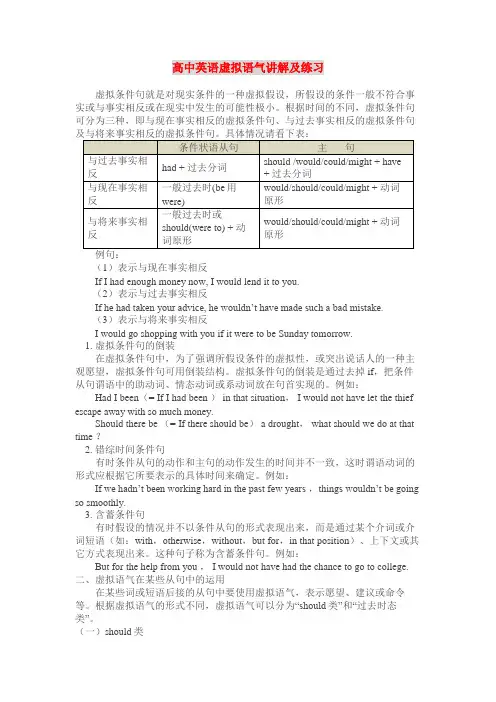
高中英语虚拟语气讲解及练习虚拟条件句就是对现实条件的一种虚拟假设,所假设的条件一般不符合事实或与事实相反或在现实中发生的可能性极小。
根据时间的不同,虚拟条件句可分为三种,即与现在事实相反的虚拟条件句、与过去事实相反的虚拟条件句(1)表示与现在事实相反If I had enough money now, I would lend it to you.(2)表示与过去事实相反If he had taken your advice, he wouldn’t have made such a bad mistake.(3)表示与将来事实相反I would go shopping with you if it were to be Sunday tomorrow.1. 虚拟条件句的倒装在虚拟条件句中,为了强调所假设条件的虚拟性,或突出说话人的一种主观愿望,虚拟条件句可用倒装结构。
虚拟条件句的倒装是通过去掉if,把条件从句谓语中的助动词、情态动词或系动词放在句首实现的。
例如:Had I been(= If I had been ) in that situation, I would not have let the thief escape away with so much money.Should there be (= If there should be) a drought, what should we do at that time ?2. 错综时间条件句有时条件从句的动作和主句的动作发生的时间并不一致,这时谓语动词的形式应根据它所要表示的具体时间来确定。
例如:If we hadn’t been working hard in the past few years ,thing s wouldn’t be going so smoothly.3. 含蓄条件句有时假设的情况并不以条件从句的形式表现出来,而是通过某个介词或介词短语(如:with,otherwise,without,but for,in that position)、上下文或其它方式表现出来。
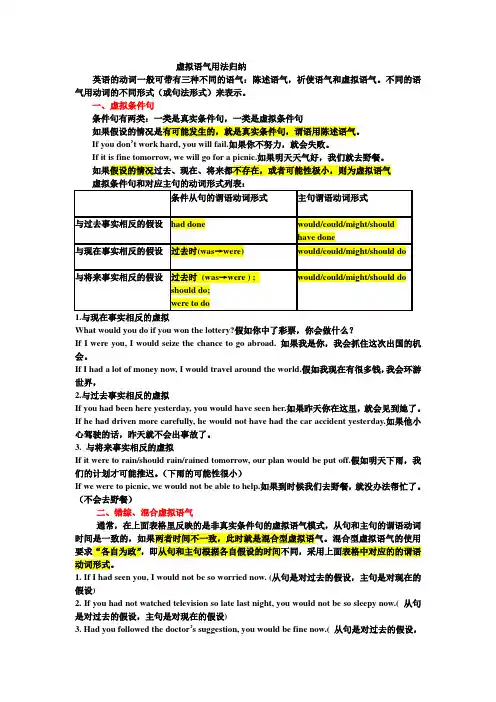
虚拟语气用法归纳英语的动词一般可带有三种不同的语气:陈述语气,祈使语气和虚拟语气。
不同的语气用动词的不同形式(或句法形式)来表示。
一、虚拟条件句条件句有两类:一类是真实条件句,一类是虚拟条件句如果假设的情况是有可能发生的,就是真实条件句,谓语用陈述语气。
If you don’t work hard, you will fail.如果你不努力,就会失败。
If it is fine tomorrow, we will go for a picnic.如果明天天气好,我们就去野餐。
如果假设的情况过去、现在、将来都不存在,或者可能性极小,则为虚拟语气虚拟条件句和对应主句的动词形式列表:1.与现在事实相反的虚拟What would you do if you won the lottery?假如你中了彩票,你会做什么?If I were you, I would seize the chance to go abroad. 如果我是你,我会抓住这次出国的机会。
If I had a lot of money now, I would travel around the world.假如我现在有很多钱,我会环游世界,2.与过去事实相反的虚拟If you had been here yesterday, you would have seen her.如果昨天你在这里,就会见到她了。
If he had driven more carefully, he would not have had the car accident yesterday.如果他小心驾驶的话,昨天就不会出事故了。
3. 与将来事实相反的虚拟If it were to rain/should rain/rained tomorrow, our plan would be put off.假如明天下雨,我们的计划才可能推迟。
(下雨的可能性很小)If we were to picnic, we would not be able to help.如果到时候我们去野餐,就没办法帮忙了。
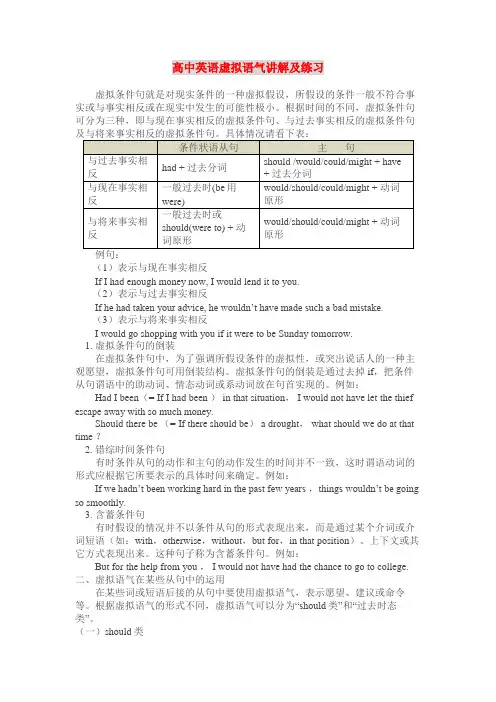
高中英语虚拟语气讲解及练习虚拟条件句就是对现实条件的一种虚拟假设,所假设的条件一般不符合事实或与事实相反或在现实中发生的可能性极小。
根据时间的不同,虚拟条件句可分为三种,即与现在事实相反的虚拟条件句、与过去事实相反的虚拟条件句(1)表示与现在事实相反If I had enough money now, I would lend it to you.(2)表示与过去事实相反If he had taken your advice, he wouldn’t have made such a bad mistake.(3)表示与将来事实相反I would go shopping with you if it were to be Sunday tomorrow.1. 虚拟条件句的倒装在虚拟条件句中,为了强调所假设条件的虚拟性,或突出说话人的一种主观愿望,虚拟条件句可用倒装结构。
虚拟条件句的倒装是通过去掉if,把条件从句谓语中的助动词、情态动词或系动词放在句首实现的。
例如:Had I been(= If I had been ) in that situation, I would not have let the thief escape away with so much money.Should there be (= If there should be) a drought, what should we do at that time ?2. 错综时间条件句有时条件从句的动作和主句的动作发生的时间并不一致,这时谓语动词的形式应根据它所要表示的具体时间来确定。
例如:If we hadn’t been working hard in the past few years ,thing s wouldn’t be going so smoothly.3. 含蓄条件句有时假设的情况并不以条件从句的形式表现出来,而是通过某个介词或介词短语(如:with,otherwise,without,but for,in that position)、上下文或其它方式表现出来。
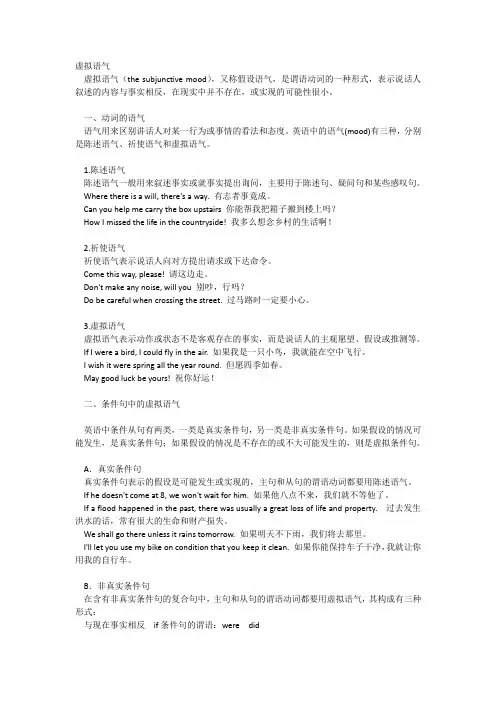
虚拟语气虚拟语气(the subjunctive mood),又称假设语气,是谓语动词的一种形式,表示说话人叙述的内容与事实相反,在现实中并不存在,或实现的可能性很小。
一、动词的语气语气用来区别讲话人对某一行为或事情的看法和态度。
英语中的语气(mood)有三种,分别是陈述语气、祈使语气和虚拟语气。
1.陈述语气陈述语气一般用来叙述事实或就事实提出询问,主要用于陈述句、疑问句和某些感叹句。
Where there is a will, there's a way. 有志者事竟成。
Can you help me carry the box upstairs 你能帮我把箱子搬到楼上吗?How I missed the life in the countryside! 我多么想念乡村的生活啊!2.祈使语气祈使语气表示说话人向对方提出请求或下达命令。
Come this way, please! 请这边走。
Don't make any noise, will you 别吵,行吗?Do be careful when crossing the street. 过马路时一定要小心。
3.虚拟语气虚拟语气表示动作或状态不是客观存在的事实,而是说话人的主观愿望、假设或推测等。
If I were a bird, I could fly in the air. 如果我是一只小鸟,我就能在空中飞行。
I wish it were spring all the year round. 但愿四季如春。
May good luck be yours! 祝你好运!二、条件句中的虚拟语气英语中条件从句有两类,一类是真实条件句,另一类是非真实条件句。
如果假设的情况可能发生,是真实条件句;如果假设的情况是不存在的或不大可能发生的,则是虚拟条件句。
A.真实条件句真实条件句表示的假设是可能发生或实现的,主句和从句的谓语动词都要用陈述语气。
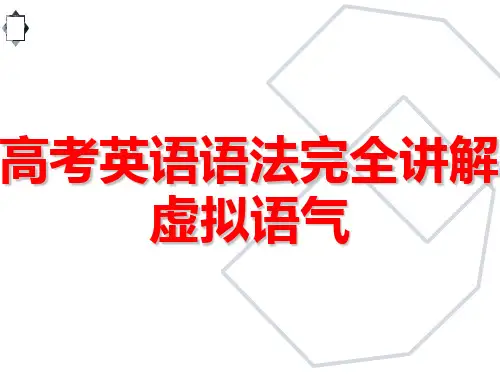
第一讲动词的语气概说:语气是一种动词形式,用以表示说话者的意图或态度。
英语中的语气有三种:即直陈语气、祈使语气和虚拟语气。
说话者的意图或态度可以通过不同的方式表示出来。
选择适当的语气形式是期中最基本的一种。
说话者在说话时首先必须表示自己的态度,即认为这个动作是事实、是请求或命令还是愿望、假想或建议,然后根据这种态度选用不同的动词语气形式。
我们在每一个句子中都可以发现说话者的态度。
这也就是说,语气形式对任何一个谓语动词来说都是不可缺少的。
虚拟语气定义:虚拟语气是一种动词形式,表示说话人的一种愿望,假设,怀疑,猜测,建议、请求、命令等含义,虚拟语气所表示的假设含义不是客观存在的事实。
虚拟语气通常有三类动词形式表示:1、虚拟式动词形式(be、were)。
2、过去时动词形式。
(一般表示与现在的事实相反)3、过去时情态助动词(过去完成时表示与过去的事实相反)重点:名词性从句和状语从句中的虚拟语气难点:非真实条件句中的虚拟语气内容:一、简单句中的虚拟语气1.说话时,为了表示客气、谦虚、委婉而有礼貌,言语常使用虚拟语气。
其虚拟语气的动词形式常为:would / could / might / should + 原形动词。
如:Would you mind my shutting the door? 我把门关起来你介意吗?You should always learn this lesson by heart.你要把这个教训牢记于心。
I should agree with you. 我应该同意你的观点。
2.表示“祝愿”时,常用“may + 主语 + 动词原形 + 其他”。
如:May you have a good journey! 祝你一路顺风。
May your youth last for ever! 祝你青春永驻。
3.表示强烈的“愿望”、“祝愿”时,常用动词原形。
如:Long live the Communist Party of China. 中国万岁。
虚拟语气一、虚拟语气的含义英语中有下列三种语气:陈述语气:用来陈述事实。
用于陈述句、疑问句和感叹句。
祈使语气:提出请求、劝告、指示、命令等。
仅用于祈使句。
虚拟语气:常表示说话人所说的不是事实,或事情发生的可能性很小,或不可能发生,是说话人的一种主观愿望、假设、建议、或推测等。
一般常用于正式的书面语中。
二、虚拟语气在if 引导的非真实条件中的用法:主要用法列表如下:如:If I were you, I should seize the chance to go abroad. (现在)If I had time, I would attend the meeting. (现在)If you had taken my advice, you would not have failed in the exam.If it were to rain tomorrow, the sports meeting would be put off. (将来)II. 易错点分析1、倒装条件句如果条件句中有were, had, 或should 等现成助动词,可把他们提到主语之前,省去if。
Had I had time, I would have helped you.Should it clear up tomorrow, we would go for on outing.Were I you, I would accept the invitation.注意:若省略if的条件句中的谓语是否定形式时,不能用动词的缩略式.如不能说:Weren’t it for the expense, I would go abroad now. 应该说:Were it not for the expense, I would go abroad now.2、错综时间条件句(混合时间句):主句和从句的动作不是发生在同一时间,这时要根据各自的时间来调整。
(完整版)虚拟语气讲解及练习题(含答案和解释)虚拟语气讲解与练习黄志刚2013.10.一. 简介虚拟语气用来表示说话人的主观愿望或假想,而不表示客观存在的事实,所说的是一个条件,不一定是事实,或与事实相反。
虚拟语气通过谓语动词的特殊形式来表示。
英语中的语气分为陈述语气、祈使语气、虚拟语气在什么情况下用虚拟语气? 在表示虚假的、与事实相反的或难以实现的情况时用虚拟语气,表示主观愿望或表示某种强烈情感时,也用虚拟语气。
即当一个人说话时欲强调其所说的话是基于自己的主观想法,而不是根据客观实际,就用虚拟语气。
二. 虚拟语气在非真实条件状语从句中的用法1、真实条件状语从句与非真实条件状语从句真:eg . If he doesn’t hurry up, he will miss the bus. 如果他不快点,他将错过巴士。
( 真实条件状语)(不是虚拟语气)If he is free, he will ask me to tell stories. 如果他是空闲的,他会要求我讲故事。
(真实条件状语)(不是虚拟语气)非真:eg. If I were you, I would go at once.如果我是你,我马上就会去。
(非真实条件状语从句)If there were no air, people would die. 如果没有空气,人就会死亡。
(非真实条件状语从句)2、用法及动词形式1、表示与现在事实相反的情况,例1.If I were you, I would take an umbrella.如果我是你,我会带把伞。
(事实:我不可能是你) 2.If I knew his telephone number, I would tell you. 如果我知道他的电话号码,我就会告诉你。
(事实:不知道) 3.If there were no air orwater, there would be no living things on the earth. 如果没有水和空气,地球上就不会有生物。
高中英语虚拟语气讲解及练习虚拟条件句就是对现实条件的一种虚拟假设,所假设的条件一般不符合事实或与事实相反或在现实中发生的可能性极小。
根据时间的不同,虚拟条件句可分为三种,即与现在事实相反的虚拟条件句、与过去事实相反的虚拟条件句(1)表示与现在事实相反If I had enough money now, I would lend it to you.(2)表示与过去事实相反If he had taken your advice, he wouldn’t have made such a bad mistake.(3)表示与将来事实相反I would go shopping with you if it were to be Sunday tomorrow.1. 虚拟条件句的倒装在虚拟条件句中,为了强调所假设条件的虚拟性,或突出说话人的一种主观愿望,虚拟条件句可用倒装结构。
虚拟条件句的倒装是通过去掉if,把条件从句谓语中的助动词、情态动词或系动词放在句首实现的。
例如:Had I been(= If I had been ) in that situation, I would not have let the thief escape away with so much money.Should there be (= If there should be) a drought, what should we do at that time ?2. 错综时间条件句有时条件从句的动作和主句的动作发生的时间并不一致,这时谓语动词的形式应根据它所要表示的具体时间来确定。
例如:If we hadn’t been working hard in the past few years ,thing s wouldn’t be going so smoothly.3. 含蓄条件句有时假设的情况并不以条件从句的形式表现出来,而是通过某个介词或介词短语(如:with,otherwise,without,but for,in that position)、上下文或其它方式表现出来。
虚拟语气在英语表达中,说话人说话的口气即语气。
除了语调之外,最主要的是需要使用动词的不同形式来表现各种语气。
英语中一共有三种语气:陈述语气、祈使语气和虚拟语气。
日常生活中大多数的句子都使用陈述语气,祈使句使用祈使语气。
本章主要着重讲解虚拟语气的用法,因为虚拟语气只在某几类句子中才使用,这种特殊性决定了虚拟语气在高中语法学习中的重要性。
典型例句:1.She is a pretty little girl.她是一个俊俏的小姑娘。
(陈述语气)2.Have a good holiday!(祝你)假日愉快!(祈使语气)3.If you love her,you wouldn’t say that.假如你爱她,你就不会说出那种话。
(虚拟语气)一、虚拟语气用于条件句1.非真实条件句虚拟语气可用于条件句中,条件句分为两种:一种是真实条件句,另一种是非真实条件句。
只有在非真实条件句中才用虚拟语气,在真实条件句中,要用陈述语气。
真实条件句:如果假设的情况完全不存在或者实现的可能性很小,可以说几乎没有时,就需要用虚拟语气来表示,也就是说,这时的条件句是非真实的条件句。
此时的句子时态比真实条件句中的时态后退一步。
非真实条件句(以do和be为例):重要:在非真实条件句中,如果谓语动词是be,一般要用were,特别是在较正式的文体中;在口语中,除了If I were you结构中的were不能改动外,在第一、三人称后,有时可用was。
在与将来事实相反的条件从句中,几种结构中所表示的可能实现的程度有区别:were to do可能性最小;should+do可能性稍大一些。
如果表示否定的意思,多用过去时结构,用should和were to较少。
2.错综时间条件句有时在非真实条件句中,主句中谓语动词所表示的动作和条件从句中谓语动词所表示的动作并不是同时发生的,这时动词的形式并不完全按照上述表格来进行,而需要按照各自的时间来进行调整,这样的句子就叫错综时间条件句。
英语虚拟语气讲解(高中)一、语气概述语气是动词的又一种形式,通过说话人所说的话体现出说话人对某一个动作或状态所持的态度和看法。
英语中有三种语气:1.陈述语气——用来陈述事实,广泛用于陈述句和疑问句中。
现行中学英语教材中,绝大部分句子均属陈述句语气,句中谓语动词有各种时态和语态变化。
2.祈使语气——用来提出请求、要求、发出命令等,只用于祈使句。
3.虚拟语气——用来表示主观愿望和假想虚拟的情况,即所说内容与事实相反,或者实现的可能性极小,或者是假想虑拟的情况。
如:He is honest.他很诚实。
(陈述语气)Don‘t belate next time.下次别迟到。
(祈使语气)If I were you,I would not go.我要是你,我就不会去。
(虚拟语气)I wish I had a lot of money.要是我有很多很多钱就好了。
(虚拟语气)二、虚拟语气虚拟语气是一种特殊的动词形式,用来表示说话人所说的话不是一个实事,而只是一种愿望、假设、怀疑、建议、猜测、可能或纯粹的空想等。
虚拟语气通过动词的形式来表示。
主要用在if条件状语从句中,名词性从句中(主语从句、宾语从句和表语从句),也可以出现在简单句中。
如:If you should miss the chance,you would feel sorry for it.(if条件句)如果你错过了这次机会,你会难过的。
If I were in your position,I would marry her.如果我是你,我就娶她为妻。
(if条件句)If it had not rained so hard yesterday,we could have played tennis.(if条件句)如果昨天没有下大雨,我们就能玩网球了。
I insisted that he(should)go with us.我坚持让他和我们一起去。
My suggestion is that we should go there at once.我的建议是我们应该马上去那儿。
语法讲解——虚拟语气英语中有三种不同的语气:陈述语气,祈使语气和虚拟语气。
虚拟语气表示动作或状态与事实相反,或不可能发生的情况。
1. 表示与现在事实相反或不可能发生:条件状语从句:一般过去时(虚拟语气中be→were)主句用:would(should, could, might)+动词原形。
If we had time now, we would read it again.If I were you, I would work hard.2. 表示与过去事实相反或不可能发生:条件状语从句:had+过去分词;主句:would(should, could, might)+have+过去分词。
If he had taken my advice, he would have succeeded in the test.If I had known your telephone number then, I would have called you.3. 表示与将来的事实可能相反或不可能发生:条件状语从句:①一般过去时②should +动词原形③were to+动词原形;主句:would(should, could, might)+动词原形。
If it should rain, the crops would be saved.If it were to snow tomorrow, they would not go out.P.S 虚拟条件句的特殊情况(1). 混合/错综型虚拟语气当条件状语从句表示的行为和主句表示的行为所发生的时间不一致时,称为‘错综条件句’,动词的形式要根据它所表示的时间作出相应的调整。
If you had followed my advice, you would be better now.(从句说的是过去,主句是现在)If I were you, I would have taken his advice.(从句是现在,主句是过去)(2)省略if的虚拟语气如果从句中含有were/ should/ had时,则可以把这三个词置于句首,省略if.采用倒装语序。
If it should happen, what would you do? →Should it happen, what would you do?If he had recognized me, he would have come over. →Had he recognized me, he would have come over. (3) 含蓄虚拟条件句有时候假设的情况不以if引导的条件从句形式表现出来,而是通过一个介词短语,连词或其他形式表示。
常用的词或短语有:without, with, but for(要是没有), otherwise, or, but等。
Without your help(=If we had not had your help), we could not have succeeded.But for electricity(=If there were no electricity, there would be no modern industry.He felt very tired yesterday, or/ otherwise he would have attended the party.(4) 在if it were( had been )not for ….句型中的虚拟语气虚拟语气也常用于‘if it were/(had been) not for ….’句型中,意为‘要不是由于…’。
If it were not for peace, we could not be living a happy life today.If it had not been for your timely help, I would have gone bankrupt.二.虚拟语气用在名词性从句中1.主语从句中的虚拟语气这种虚拟语气主要用在it is+形容词(名词,过去分词)+that+主语+should+动词原形(should可以省略)这种结构中。
∙常见的这类形容词有:advisable, anxious, better, desirable, surprising, natural, necessary, strange, important, regretful.∙常见的这类过去分词有:decided, demanded, recommended, requested, desired, required, ordered, suggested.常见的这类名词有:duty, pity, no surprise, no wonder, regret, shame.It was suggested that he(should)join the club activities. It is strange (surprising, disappointing) that she (should) not have been invited.It is a pity that he (should) refuse to accept the offer.2. 宾语从句中的虚拟语气①wish 后面所跟宾语从句谓语动词用虚拟语气(意为要是,但愿…就好了),其形式主要有三种:表示对现在情况的虚拟:wish后接一般过去时的从句表示对过去情况的虚拟:wish后接过去完成时/should,could have done表示对将来情况的虚拟:wish后接would,could+动词原形Iwish it were spring all year round.I wish it would be fine tomorrow.She wished she had stayed at home.②在表示建议,命令,要求等动词后的从句要用(should)+动词原形。
此类动词有:suggest, advise, propose, demand, require, insist(要求), order, prefer, command, ask, request. The teacher ordered that all the books (should) be handed in on time.P.S. 当suggest表示‘暗示,说明’之意;insist表示‘坚持认为,坚持说’之意时,从句不用虚拟,用正常的陈述语气。
The man insisted that he had never stolen the money. The smile on his face suggested that he was satisfied with life.3. 表语从句和同位语从句中的虚拟语气在表示建议,命令,要求的名词后的表语从句或同位语从句中的谓语动词要用(should)+动词原形。
常见名词有:advice, desire, request, demand, proposal, suggestion, preference, requirement, order.He gave orders that the guests (should) be hospital entertained.His proposal is that we (should) get rid of the bad habits. 三.虚拟语气在其他情况中的使用1.在as if/ as though引导的状语从句中,若从句与事实相反,则要用虚拟语气。
其形式如下:主语+as if/ though +主语+一般过去时(从句的动作与主句同时发生)主语+as if/ though +主语+would/could+动词原形(从句的动作相对主句来说在将来发生)主语+as if/ though +主语+过去完成时(从句的动作先发生于主句动作之前)He talks as if he knew all about it.She speaks English well as if he had studied in America. He learns English so hard as if he would go abroad.2.在it is (high) time that …句型中也用虚拟语气,从句常用过去式,有时也用should +动词原形,表示早该做而没做的事,含建议的意味。
It is time that we went home.P.S.此句型中,注意与‘It/This is the +序数词+time that+现在完成式的区别。
This is the first time that I have been here.3.would rather后接动词原形,但接从句时要用虚拟语气(宁愿,但愿)。
Would rather +主语+一般过去时(表示与现在或将来相反)Would rather +主语+过去完成时(表示与过去相反)I’d rather he didn’t go now.I’d rather you hadn’t done it.4. if only后接从句也用虚拟语气,其形式与wish的用法一致。
5. 动词hope, intend, mean, plan, want, think等词用过去完成的形式,表示的意思为‘本想,本打算,本认为’He had meant to buy the furniture last week, but it rained. (他上周本打算去买那件家具,但却下雨了)虚拟语气练习题精选1. The teacher demanded that the exam _____ before eleven.A. must finishB. would be finishedC. be finishedD. must be finished2. She made the demand that the journalists _____ at once ______ Iraq.A. leave; forB. leave; toC. left; toD. to be left; for3. He is talking so much about America as if he _____ there.A. had beenB. has beenC. wasD. has gone4. The young man insisted that he _____ nothing wrong and _____ free.A. did; setB. had done; should be setC. should do; be setD. had done; must be set5. I suggested there ____ be a kind of language all could understand and use ____ .A. can; itB. /; /C. would; itD. may; /6. The suggestion has been made _____ the basketball game _____ put off.A. for; toB. that; beC. which; shouldbe D. to; being7. The order came that the medical supplies _____ to Beijing for the Sars soon.A. would be sentB. should sendC. be sentD. must be sent8. It is important that we _____ wild animals.A. will protectB. should protectC. shallprotect D. are protecting9. Had you listened to the doctor, you _____ all right now.A. areB. wereC. would beD. would have been10. _____ any change about the date, please tell me immediately.A. Will there beB. Should there beC. There will beD. There should be11. _____ today, he _would get there by Friday.A. Would he leaveB. Was he leavingC. Were he to leaveD. If he leave12. Should it rain, the crops _____ .A. would be savedB. would have been savedC. will be savedD. had been saved13. You _____ come earlier. The bus left a moment ago.A. wouldB. should haveC.may D. have14. He treated me as though/as if _____ his own son.A. I amB. I would beC. I wasD. I were15. I _____ you some money, but I hadn’t any on me then.A. would lendB. would have lentC. could lendD. may have lent16. A few minutes earlier and we ____ the rain.A. have caughtB. had caughtC. could havecaught D. were to catch17. --- “Have you ever been to Beijing?”--- “No, but I wish I _____”A. haveB. willC. doD. had18. I’m glad I went over all my notes; otherwise _____ .A. I may have failedB. I’d failC. I’d have failedD. I’ll have failed19. --- “What will you do during the summer holiday?” --- “I don’t know, but it’s high time _____ something.”A. I’m decidingB. I’ll decideC. Idecided D. I decide20. What should we do if it _____ tomorrow?A. should snowB. would snowC.snow D. will snow21.09安徽But for their help, we ______ the program in time.A . can not finish. B. will not finish C. hand not finished D. could not have finished22.09江苏He did not regret saying what he did but felt that he _____ it differently.A . could express. B.. would express. C. could have expressed. D. must have expressed.23. 09浙江. The doctor recommended that you ____ swim after eating a large meal.A. wouldn’t.B. couldn’t.C. needn’tD. shouldn’t24.09福建. But for the help of my English teacher, I ____ the first prize in the English Writing Competition.A . would not win. B. would not won. C. would win. D. would have won.25.09重庆. ----Hi, Tom. Any idea where Jane is?----She ____ in the classroom. I saw her there just now.A. shall be.B. should have been.C. must be.D. might have been.。